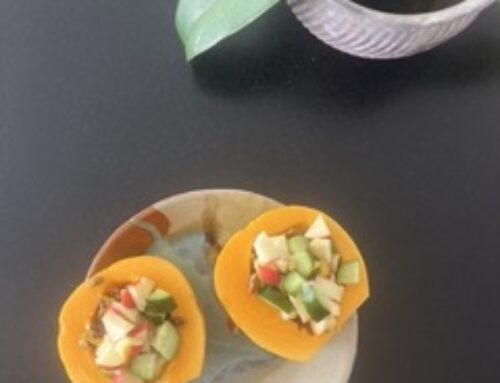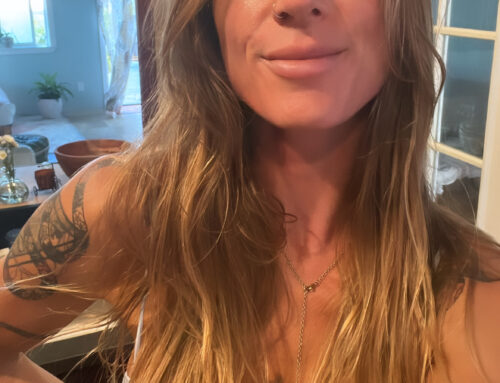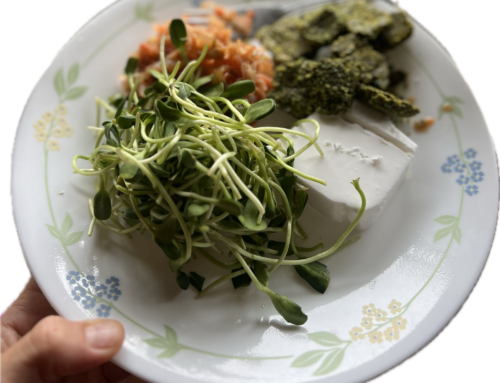Once upon a time I tuned into a doctor say, “carbohydrates are a non-essential macronutrient.” Without fat & protein we die, but without carbohydrates we simply live on and live without. This is because, despite the brain preferring glucose for fuel, it can – if it has to – survive off of ketones.
This got me. Floored, I questioned everything I was doing that incorporated carbohydrates and I figured, “well I know a thing or two about a reduced carbohydrate diet, I’ve done all the diets and this one is no stranger.” So I went on, reduced and in some cases eliminated carbohydrates and became “fat adapted and metabolically flexible.” It was rather impossible on a Vegan diet which was my way of life for many many years so I rather abruptly gravitated toward meat, fish and eggs and pretty much overnight stopped consuming grains, beans, starches and high sugar fruits (like bananas, dates, mangos etc). Mind you, this is the short version. There was actually quite a bit of transition going on at this time but I’ll spare you those details for now. What “fat adapted” really means is you train the body to work off of fat stores as opposed to stored glucose. It’s a relatively easy concept to adapt: stop eating high glycemic foods like complex and refined carbs and train your body to run off of fat and protein for fuel.
But was it right for me? Was it healthy? What actually happened?
Eating a low carbohydrate diet works for about 6-9 months for women. Depending on who you follow or what you listen to, you can give or take that time frame. Women might experience weight loss and reduced bloating. Other apparent benefits may include more energy and motivation toward sticking to the diet and exercise program. After all, the mind translates change as I’m transforming and this must be working.
Quite drastically, my hair began to thin, my skin turned vapid, I broke out worse not less, my moods fluctuated heavily and I felt more depressed around my periods. My cycles themselves were shorter in duration but longer in length; 6 days of bleeding as opposed to 3 or 4 and a 28 day cycle as opposed to a 30-32 day cycle. I also began sleeping like utter SHIT. I started using Vegamour for my thinning hair and buying skincare products for wrinkles (coffee eye cream anyone?). What was hard to accept was that my body also felt, at times, less bloated and I was enjoying – for the most part – what I was eating. I should probably set it straight that I’m not plant based because I don’t think meat tastes good. I’m also not plant based entirely for the animals. While I’d never kill my own food (unless it was fish, for some reason I’m less emotionally attached to them) I still don’t feel triggered by buying butchered meat from the store. Sorry. This is just me. Regardless, I’ll cozy up to a cow or a dear any day and promise never to eat them. I eat plant based 110% for health reasons.
I digress.
I couldn’t stop heeding this information. I was gravitating toward journals, research and doctors who’d purvey this way of life so it took me over a year to get back to my roots. Plus, with all of the heavy social influencing that happens on media platforms it’s quite easy to be swayed on a more emotionally vulnerable day (dare I say, a “fat” day or a, “I’m not good enough day”). Despite my health challenges, the science kind of grabbed at my higher conscience because – well – like many of us, I’m susceptible like that. I stopped making interesting food, I stopped taking food photography and took more photos of myself and less of what I was eating because let’s be frank, meat isn’t pretty – but plants are (!) and I started to try and accept that this was “the new me.” Gasp! Keto comes with a side order of selie-itus.
Lastly, my body’s set point never changed. When I hit my base weight which is where I like to be aka: my clothes fit and I feel sexy and energetic, it was neither plant based nor low-carb that got me there. It was food and however much of it I was eating. This is when it clicked.
Let’s talk about Caloric Density & Weight Loss a minute…
I missed myself.
I missed food that made me feel good and excited about.
I missed my creativity.
So one day I just kinda stopped with the low-carb stuff and went back to the Dr. Gregor, Neil Bernard, the Physicians Committee, and Plant Based News (and put relinquished Dr. Axe, Rob Wolfe and the Carnivore MD) plus many of the positive influences I used to heed and latch to in times of higher healing and creativity. Want to know the kicker? I returned to myself about 2 years post divorce and transition into single motherhood – therefore it’s important we consider not just the food’s we’re choosing and the information we’re heading but the PLACES in our lives that we’re moving through.
A simple way to grasp Caloric Density is to measure the caloric density of a food. Let’s say:
1 cup steak: 679
1 cup of cheese: 531
1 cup of tortilla chips: 293
1 cup of oil: 1,910
1 cup of peanut butter: 1,518
1 cup of dates: 414
1 cup of apples: 57
1 cup of broccoli: 55
1 cup of potato: 166
1 cup of chickpeas: 269
Calories in, calories out. Resting metabolic rate. Caloric deficit. All kind of “icky” topics for those of us honing intuitive prowess because these scientific-y terms sway us from body intelligence and more into measurements which is anything but. All that aside, you can do this kind of measuring mentally over time once you begin eating a wide range of foods (which I suggest we ALL do). I offered a full array of foods from vegan sources to animal sources in the lis above to give you an idea. Caloric density has a lot to do with volume. You can keep caloric intake pretty even keeled if you eat very small portions of animal and processed food. You can also keep caloric intake pretty even keeled if you eat large quantities of plant based foods. Thus, volume matters. Caloric density matters. Food quality and quantity matters.
Therefore it’s not a matter of carbohydrates in ones diet, its more a matter of excess calories and where they’re coming from which, mind you, tends to come from HIGHLY PALATABLE REFINED foods such as crackers, chips, breads, baked goods and anything that comes out of a factory. For lack of better analogies, these foods are basically “pre-chewed” minus the enzymes, fiber and nutrients and cause major spikes to our blood sugar. Plant foods or Animal foods aside, it’s the *excess of calories from non-foods that we generically mislabel and blanket as: carbohydrates.
The question of whether carbs are friend or foe becomes NIL when it’s down to you and your weight – and weight alone.
So how hungry are you?
Let’s talk CARBS and why you should eat them:
For starters, women have higher vitamin and mineral needs. This is probably due to our delicate hormonal structure and sloughing of monthly blood, etc.
We can go periods of time = feast or famine = without carbohydrates but if you’re on any kind of self love body journey you know it’s ALL about sustainability. Going carb-free is not sustainable, not unless you have a very difficult auto immune disorder in which case you wouldn’t be just tinkering with diets here and there you would be going FULL fledged and with abandon to heal your body (God, I’d hope so). Consider Mikheila Peterson for example. If you are simply in it to lose weight, I beg you to table your vanity and recommit for the long haul.
Aside from carbohydrates being our main source of fuel – brain and body cells combined – carbohydrates give us energy and make us happy. Whole food sources include:
- Whole grains: quinoa, amaranth, barley, brown rice, oatmeal, whole-grain pasta and whole-grain breakfast cereals
- Fruits: berries, citrus fruits, melons, apples, pears, bananas and kiwifruit
- Starchy vegetables: sweet potatoes, yams, corn, peas and carrots
- Legumes: lentils, black beans, pinto beans, navy beans, chick peas and soybeans
- Alternative milks such as soy, almond & oat
- Nonstarchy vegetables: leafy greens, spinach, cabbage, asparagus, tomatoes, broccoli, cauliflower, green beans, cucumbers, peppers, zucchini and mushrooms
- Nuts and seeds: pumpkin seeds, sunflower seeds, almonds, cashews, walnuts, peanuts and pistachios
- Tofu & tempeh
If you look at the above list you’ll notice that these foods create the BULK of a plant based diet. So the next time you look at a plant based influencer and wonder why in the actual F she/he looks so damn amazing – you can attribute it to their chock-full-of-carb diet.
Carbohydrates, while delicious, also create a chemical reaction in the body which boosts our brain’s release of serotonin – 90% of which is produced in the gut – which then communicates to the brain that we feel calm and satisfied. How stellar is that?
Also, women’s hormones are sensitive to energy availability. What this means is too few calories or carbs can cause imbalances that have very serious consequences, including impaired fertility, low mood and even weight gain. Might wanna read that again.
Fiber has been shown to help bind used up estrogens in the gut and safely remove them from the body before they recirculate and lead to estrogen excess which causes symptoms of PMS as well as heavy and painful periods. This is why low carb diets tend to hurt, rather than help us over time. No or low carb diets can cause amenorrhea (I’ve experienced in this first hand) which is the absence of your period and in some cases, ovulation. Fiber is also what leads to improved digestion – if you’re not eating foods that bulk your stool, you’re excreting less waste which means you’re retaining more toxins. That alone should say something.
Carbohydrates are anti-inflammatory which means they also have the ability to reduce the risk of depression and other mental health disorders.
Hair/skin/nails. Ketosis (when the brain operates off of ketones as opposed to glucose) has been known to cause hair loss. God no. When you reduce or eliminate carbohydrates you eliminate vitamins and minerals paramount for healthy hair and skin. Namely, biotin, vitamin C, A, D & E which complex whole and unrefined carbohydrates are abundant in. You can try including foods that are higher in these vitamin and minerals like egg yolk and organ meats to a low carb diet but I promise, you’ll probably end up supplementing before you see results. What I’ve noticed is a 10 fold difference in my hair, strength of my nails and clarity of my skin since eating more, not less, carbohydrates.
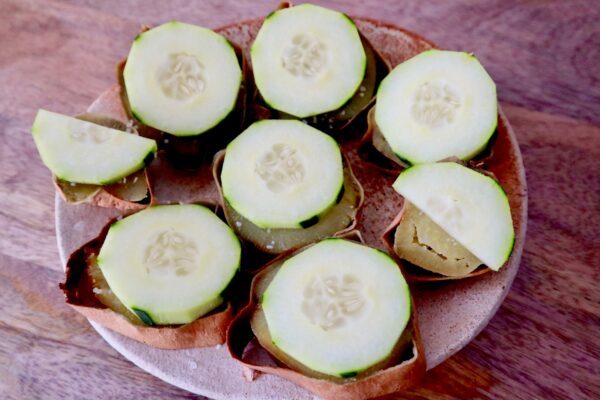
sweet potato rounds with sliced cucumber
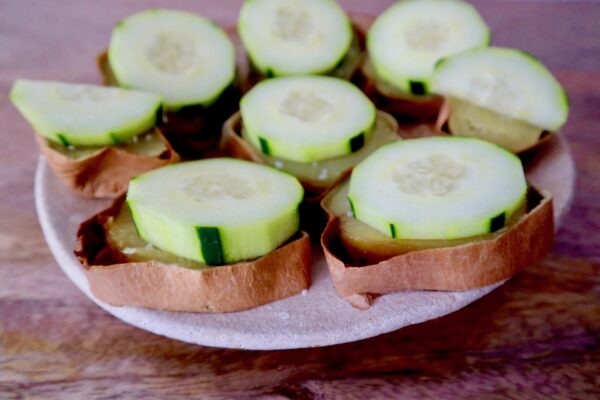
I had this for breakfast one weekend morning
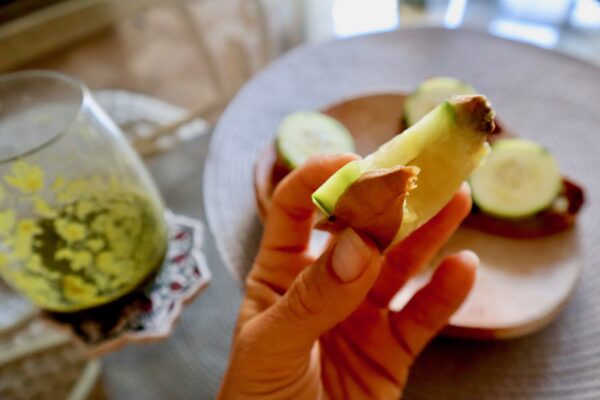
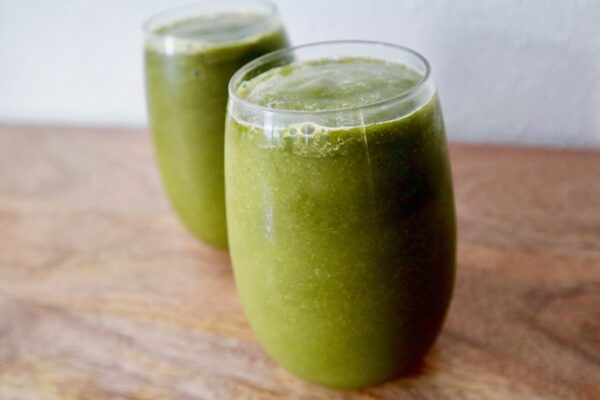
Strawberry papaya, banana, date, kale & chlorella smoothie
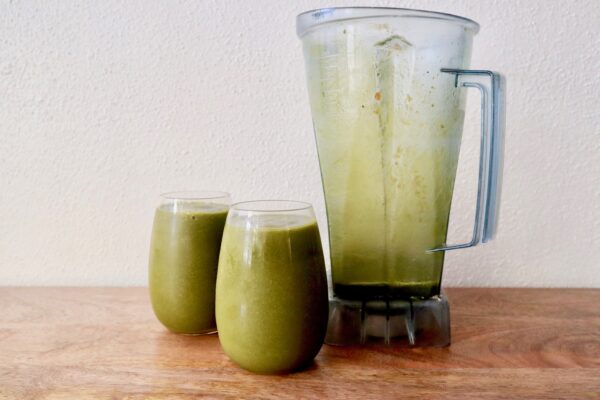
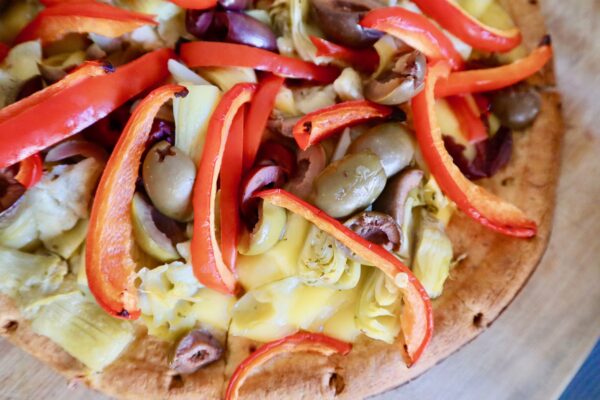
Chickpea crust (Banza), Field Roast Vegan Cheese, marinated artichokes, olives, sliced red pepper – 420 degrees for 20 minutes.
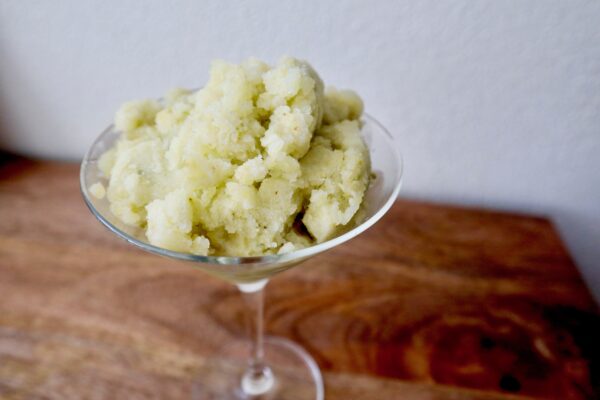
green grape sorbet
My unsolicited therapeutic advice.
- Rather than eat more protein from animal sources and less carbohydrates, simply switch the ratio. Eat more carbs and focus on plant protein or go entirely plant based.
- Start eating potatoes regularly.
- Consume less caloric density (nuts, butter, oils etc) and more volume, aka large salads with delicious dressings.
- Eat whole fat sources as opposed to their refined forms – nuts as opposed to nut butters, olives as opposed to oil, avocado as opposed to mayonnaise – which is also a simple alternative – at least 50% of the time
- Enjoy an array of fiber rich plant foods – they taste better, they’re prettier and they’ll give you heaps of boundless energy (plus help you sleep better).
- Simplify & read ingredient labels, choose your junk food wisely. Vegan junk food is really delicious and an excellent alternative to modern convenience foods. Plus I have TONS of replacements for conventional foods which we talk more about in The Journey.
- Focus on proper food combining. I speak about this in my Therapeutic Eating Program but the gist is:
- Consume complex carbs with non starchy veggies and condiments like balsamic vinegar, lemon juice & tamari (these don’t have fat and don’t compete for energy storage in the body). Consume proteins with non starchy veggies and fats like nuts and olives. Consume fruit, for the most part alone – particularly melons. Better digestion equates to happier bodies.
- Love yourself as you make any major transition from low carb to higher carb. You won’t gain as much weight as you fear. You’ll probably lose it in fact and gain a heck of a lot more peace with food. Stay tuned for more inspiration, Body Resets and updates via Instagram.
I love ya. No really, I do.


